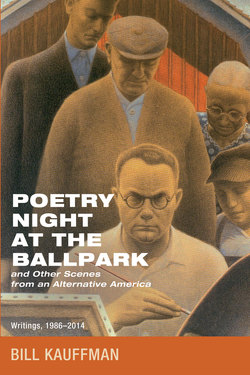Читать книгу Poetry Night at the Ballpark and Other Scenes from an Alternative America - Bill Kauffman - Страница 22
На сайте Литреса книга снята с продажи.
The Beats Go Right
ОглавлениеThe American Enterprise, 1997
The recent deaths of poet Allen Ginsberg and novelist William S. Burroughs occasioned a round of impolite obituaries accusing the dear departed and their Beat Generation pals of being subversive perverts. Yet whatever unconventionalities went on behind closed doors, their politics were squarely American: the Beats were libertarian heretics in an age of statolatry.
Beat icon Jack Kerouac was a Robert Taft Republican throughout his life. In 1952, in the predawn of his notoriety, Kerouac supported the stolid Ohio conservative for the GOP nomination while his buddy Ginsberg, son of a “Communist beauty” mother, talked up plutocratic Cold Warrior Democrat Averell Harriman, of all people. (The Beat “Adonis of Denver,” cowboy drifter Neal Cassady, said “it makes not one whit of difference who gets it.”)
Kerouac’s political comments read like Chicago Tribune editorials. In a 1948 letter, he cursed Harry Truman:
The war scare I think is just for the sake of squeeze-playing Congress into voting Universal Military Training and the Marshall Plan. It’s a dirty administration with dirty tricks-creating “emergencies” for its own political ends . . . I think we should arm and just dare anybody to attack, but I don’t think we should be the aggressors, that wouldn’t pan out.
Kerouac subscribed to and avidly read National Review and once appeared on William F. Buckley, Jr.’s “Firing Line,” where he drunkenly uttered the immortal words, “Flat-foot Floogie with the floy floy!” He painted pictures of the Virgin Mary and Pope Paul; he disliked the Vietnam War as well as its protesters: “I’m pro-American and the radical political involvements seem to tend elsewhere. . . . This country gave my Canadian family a good break, and we see no reason to demean said country.”
The prematurely cadaverous Burroughs was an anarchist who’d have fit very nicely into a conspiracy chat room. His favorite political writer was the hard-right polemicist Westbrook Pegler. In a typical passage, Burroughs imagined an American future of “ever-increasing governmental control over the private citizen, not on the old-style police-state models of oppression and terror, but in terms of work, credit, housing, retirement benefits, and medical-care: services that can be withheld. These services are computerized. No number, no service. However, this has not produced the brainwashed standardized human units postulated by such linear prophets as George Orwell. Instead, a large percentage of the population has been forced underground. How large, no one knows. These people are numberless.”
To be number-less, without a number or government ID tag choking your neck, was about the best the misanthropic Burroughs could hope for. He was fond of saying, “No problem can be solved. When a situation becomes a problem, it becomes insoluble. Problems are by definition insoluble. No problem can be solved, and all solutions lead to more problems.” Not exactly sloganeering for the Great Society.
The third member of the Beat triumvirate, Allen Ginsberg, was more predictable and less interesting than the others, but at least he outgrew his red diapers. He devoted his political energies to libertarian causes: the legalization of marijuana and homosexual relations, and, later, denunciations of the CIA. Despite his matrix, he never fell for the Communist con. He held Cuba and postwar Vietnam to be “police states,” and he accused American Sandinista-groupies of “cowardice.”
“I don’t like the government where I live,” Ginsberg sang, and his anarchistic bone was large enough that he’d have sung the same tune no matter where he lived.
The Beats ran deep in an American vein. They loved their country, whatever they thought of its government. In a 1959 manifesto defending baseball, the crucifix, and “the glee of America, the honesty of America,” Kerouac declared, “Woe unto those who think that the Beat Generation means crime, delinquency, immorality. . . . Woe unto those who spit on the Beat Generation, the wind’ll blow it back.”
The spitters have outlived the Beats. But softly the wind soughs.
